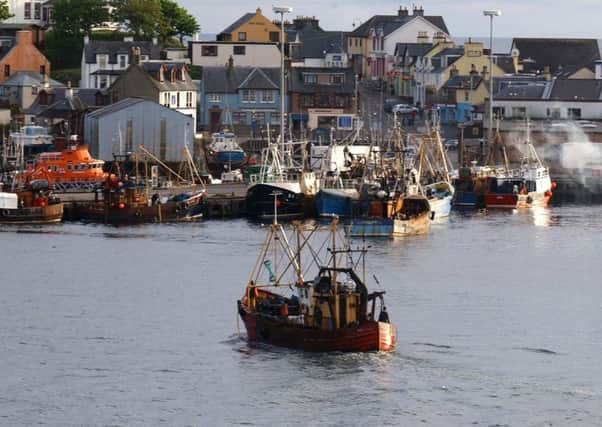Anne-Margaret Anderson: Why dredgers really are the fishermen's friends


Ever since Richard Lochhead, Cabinet secretary for rural affairs and the environment, announced his proposed management measures for the first tranche of Marine Protected Areas (MPAs) in Scottish inshore waters in June 2015, a polarised debate has ensued.
The unprecedented fallout over the plans has been afforded much publicity, with reams of print and copious airtime reporting the frustrations of prawn and scallop fishermen who fear they’ll be unnecessarily displaced from traditional fishing grounds as a result of ambitious conservation measures.
Advertisement
Hide AdAdvertisement
Hide AdComplex debates often fall foul of oversimplification and it’s regretful that this spat is no exception. Time and time again this issue has been reported by pitting the genuine concerns of hard-working fishermen against the often well meaning green agenda of marine conservation groups.
In reality, though, the fallout over MPAs isn’t as clear cut as mobile fisherman versus eNGO [environmental non-governmental organisation] and it has been unhelpful and damaging that the debate has been dumbed down to this level.
In my experience fishermen are not the bullies they have been portrayed as being. They’re also not in the business of employing intimidation tactics to get their own way.
The SWFPA represents the interests of 1,400 mobile and static fishermen from Kirkcudbright to Arbroath who, by and large, support fair and balanced MPAs – with the proviso that they’re backed by robust science.
These fishermen recognise the importance of healthy and productive seas and realise that they have a starring role to play in achieving this. While this sensible approach to marine management doesn’t make the headlines it is nevertheless a reality for the majority of honest men making a living from the seas around our coast.
In the same vein some eNGOs are not the radicals that many assume them to be. As an association the SWFPA has a healthy and productive working relationship with progressive eNGOs. We collaborate on projects where common grounds can be found with a view to improving the long-term health and productivity of our marine ecosystems for the benefit of all stakeholders. We have received recognition from various NGOs for our positive contribution to sustainable development and strong leadership.
Of course, there are fundamentalists on both sides of the table whose minds are already made up and there is little that can be done to change their outlook. What is important, however, is that those voices don’t drown out the silent majority who generally have more balanced views on the subject.
Now that we’ve had several years of consultation followed by a further eight months of impassioned exchanges on the inshore MPAs it is my view that we’re at the point where we all need to put our differences aside and shift our efforts onto the next chapter of this story. The most important chapter – making MPAs work for all sea users in Scotland, recreational and commercial alike.
Advertisement
Hide AdAdvertisement
Hide AdWhether we like it or not, we’re living in a time when there’s increasing public interest in the marine environment. Fishermen share the sea with an ever growing number of users who derive economic benefits from this natural resource – from international fish farm companies to multi-million pound renewable energy firms, from commercial anglers to hobby yachtsmen. The mobile sector is but one (albeit important) voice in this complex seascape.
Of course, change is hard to accept but let’s not sell ourselves short. Our industry is resilient and well versed in adapting to the never ending merry-go-round of changes forced upon us. Each year we adapt to new quota limits in the same way as we adapt to new policy regulations that arise from often ludicrous legislative measures – discard ban anyone? To survive in this industry we need to adapt. Nothing stays the same for long; it never has and it never will.
Our association along with several others in Scotland is fully poised to be proactive and to work constructively with government and open-minded marine conservationists to ensure that robust measures are now put in place to monitor and assess the ecological and economic impacts of our MPA network.
With a view to getting it right from here on in let’s focus our energy on following developments closely and applying appropriate pressure on government to ensure the necessary monitoring and assessments are carried out.
It is imperative that we remember this is about MPAs.
It is not about using MPAs to further more radical agendas. MPAs are about protecting what needs protecting while allowing for sustainable fishing – and yes that includes continuing with scallop dredging. Sustainable development is a balance between the economic and the environmental; getting that balance right is what we are all trying to achieve.
Scotland is blessed with a rich natural resource in the form of fish and shellfish. It is in high demand the world over and in order to meet that demand we need big boats and small boats, creel boats and trawlers, scallop divers and scallop dredgers. Anyone who claims otherwise is deluded. We are one of the few industries in Europe to be enlightened with regard to understanding our responsibility to the environment and the part that we must all play.
Our fishermen happily work with governments and eNGOs who subscribe to this rational school of thought. The radicals and fundamentalists either need to get with the programme or face being marginalised.
• Anne-Margaret Anderson is Inshore and Environmental Policy Co-ordinator for the Scottish White Fish Producers’ Association